As much as I talk about living longer and defying aging, it is also a constant focus of mine to embrace and connect to the physical, natural, beautifully limiting world we were born into. Recognizing and aligning with the beauties and rules of nature can do wonders for your overall well-being. One way to focus on reconnecting is to rediscover your natural circadian rhythm and structure your eating and sleeping habits around it.
If it feels like days and nights are just flying by and you have no sense of time or what day it is, you likely need to reset your biological clock, open your crown chakra, reground your root chakra, and time your lifestyle to your innate circadian rhythm. Doing this is not as technical or woo-woo as it may sound. Something as simple as getting sunshine when you wake up in the morning is actually scientifically proven to align your circadian rhythm and also positively affect brain function and longevity.
I’ll explain some of the adjustments and routines through which you can connect to your natural circadian rhythm and why it’s important for your overall well-being.
WHAT IS CIRCADIAN RHYTHM?
Our adaptations to the laws of the universe and nature resulted in biological measurements of time in several circular processes known as the circadian rhythm. Circadian rhythm controls the flow of life on earth from the oceans to the cells in your body. From a macro lens, the 24-hour day and night cycle of the biological clock has been conserved across many different species, from bacteria to mammals. It is thought to have evolved as a way to optimize physiological processes and behavioral patterns in line with the cyclical nature of the environment. This external clock is also an internal process that regulates the sleep-wake cycle and other biological processes in your body. The study of these time-dependent biological processes is called chronobiology.
The word “circadian” comes from the Latin words “circa” meaning “around” and “diem” meaning “a day”, indicating that these rhythms occur on a roughly 24-hour cycle. How beautiful is the thought of attempting to alleviate your health concerns and building your routines all “around a day”? One single day at a time. Your body is actually made to take it day by day.
Circadian rhythm helps to regulate the timing of your sleep-wake cycle by interacting with the production of hormones, such as melatonin. Melatonin is a hormone produced within the body that is associated with the sleep-wake cycle in relation to how the body responds to light and darkness. It is often known as the sleep hormone many people take as a supplement hoping to fall asleep and stay asleep. As the evening approaches and light levels begin to decrease, your natural biological clock should signal the pineal gland to begin producing melatonin. As these levels continue to rise throughout the night, they promote deeper and more restful sleep. In the morning, as light levels increase, the circadian clock signals the pineal gland to stop producing melatonin, which helps to promote wakefulness.
HOW NATURE’S CIRCADIAN RHYTHM GOVERNS YOUR BIOLOGICAL CLOCK
We call our internal biological clock the ‘circadian clock’. It is defined as a “complex system of molecular and cellular processes that help regulate the timing of various biological functions in living organisms”. Groups of specialized cells that contain clock genes are responsible for generating and maintaining our 24-hour cycles of activity.
These processes are controlled by a group of cells located in the hypothalamus. This is a small region of the brain that receives input from light-sensitive cells in the retina of the eye. When you take in sunlight first thing in the morning, this light goes straight through your retina into your brain to get your body aligned with the energy it needs for the day. This light input helps to synchronize the biological clock with the external environment, such as light, temperature, and social interactions, which allows the clock to adjust to changes in day length and maintain a regular 24-hour cycle. It’s easy to see why watching TV,, looking at your phone, or having all the lights on at night can distract your body from falling asleep easily.
Strategies for connecting to your internal biological clock include regular exposure to natural light, avoiding exposure to artificial light at night, maintaining a regular sleep schedule, and practicing good sleep hygiene. There are several things that can disrupt this natural rhythm, which I share below!
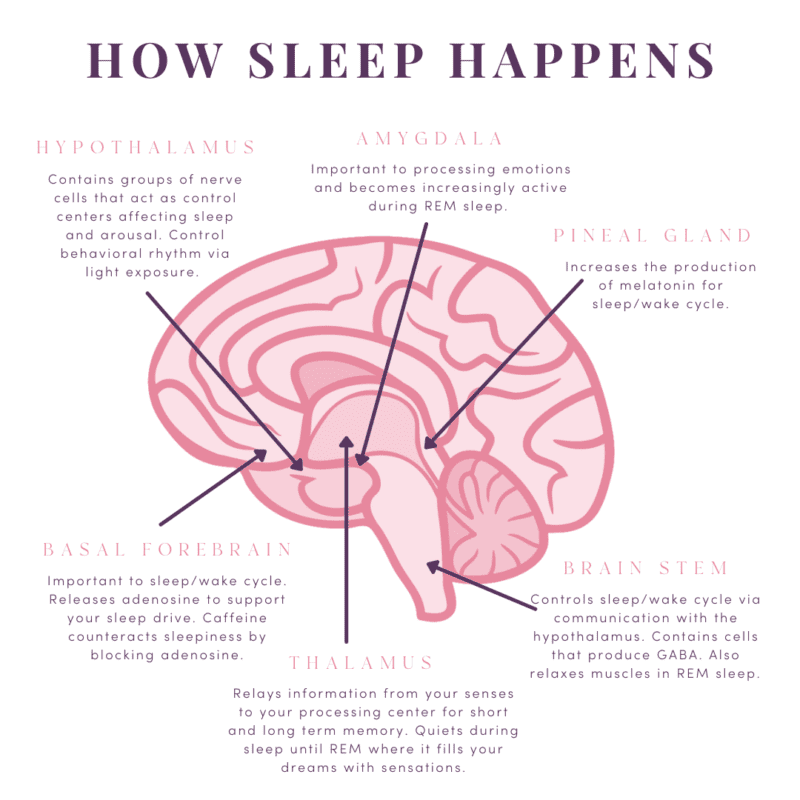
WHAT AFFECTS CIRCADIAN RHYTHM?
Several factors can negatively impact circadian rhythm, including:
- Irregular sleep patterns: I know you’re busy, traveling, or staying up to finish projects, but going to bed and waking up at different times each day can disrupt your circadian rhythm, negatively affecting your sleep quality, energy levels, and mood.
- Exposure to artificial light at night: If you can make it a habit to put your phone away an hour before bed, do it! Exposure to bright artificial light at night, particularly blue light emitted by electronic devices, can suppress the production of melatonin. This can disrupt the circadian rhythm, making it harder to fall asleep and stay asleep.
- Jet lag: Traveling across time zones can disrupt the circadian rhythm, leading to problems with sleep, energy levels, and mood. I am constantly traveling and have found several methods to cope with jet lag which I share HERE.
- Shift work: Night nurses, I see you! I often find myself working to complete my to-do list after midnight. Unfortunately, working irregular or overnight shifts can disrupt the circadian rhythm, leading to problems with sleep, energy levels, and mood. Finding ways to rest fully during the daytime can be difficult if you are only able to sleep during the day.
- Poor sleep hygiene: Poor sleep hygiene looks like not having a nightly routine, including a wind down time, such as calming music or relaxation techniques. Practice good sleep hygiene by taking into account factors that interfere with sleep, such as noise, light, uncomfortable bedding, or sleeping in a room that is too hot or too cold, can also alter the flow of your circadian rhythm. The ideal temperature for sleeping restfully for most people is between 60-67 degrees fahrenheit.
- Poor diet: A poor diet can negatively impact the circadian rhythm by disrupting metabolism, affecting sleep quality, impairing the gut microbiome, and interfering with hormone production. When your body is lacking essential nutrients, the production of hormones that are essential for regulating the circadian rhythm, such as melatonin is disrupted. To promote a healthy circadian rhythm, it is important to maintain a balanced, nutrient-dense diet and avoid consuming large meals or stimulants close to bedtime. Check out my method, Culinary Alchemy in the Serena Loves app!
- Exercise habits: Regular exercise can help to promote daytime alertness, which can improve overall sleep quality and help to regulate the circadian rhythm. Exercise has been shown to increase the production of melatonin. Exercise can also help to reduce stress levels, which can disrupt the circadian rhythm and interfere with sleep. It is important to note that the timing of exercise can also affect the circadian rhythm. Exercise in the morning or early afternoon has been shown to be most effective for promoting a healthy circadian rhythm, as exercise later in the day or evening can interfere with sleep quality and make it harder to fall asleep at night.
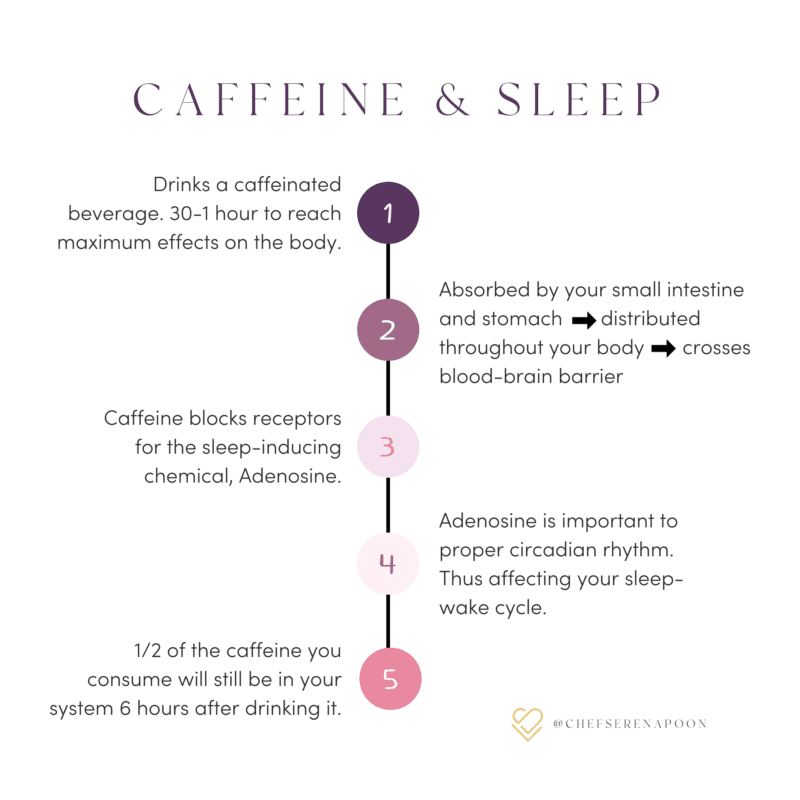
HOW TO DISCOVER YOUR NATURAL SLEEP-WAKE CYCLE
Everyone has their own natural sleep-wake cycle. Even though circadian rhythm is aligned with nature and seems very generalized, there are many things that affect exactly what bedtimes and wake times leave your body feeling its best. Discovering your natural sleep-wake cycle, can help you optimize your sleep quality and improve your overall health and well-being. Here are some tips to help you discover your natural sleep-wake cycle:
- Start a sleep diary: Record the times you go to bed, the times you wake up, and any factors that may have affected your sleep, such as caffeine consumption or stress for two weeks and see if you notice any patterns in sleep quality and quantity. Remember, you can’t improve what you can’t measure!
- Pay attention to your body: Take note of when you naturally feel sleepy and when you feel more alert and energized throughout the day. This can give you an indication of your body’s natural circadian rhythm. It can also help you determine other things about your health such as adrenal fatigue or nutrient deficiency. Learn how to check in with your body in more detail in my Serena Loves App!
- Observe your habits: Pay attention to your daily routine and how it may be affecting your sleep. For example, if you tend to drink caffeine late in the day or stay up late watching TV or using electronic devices, this may be disrupting your natural sleep-wake cycle.
- Experiment with sleep schedules: Try going to bed and waking up at the same time every day, even on weekends. This can help train your body to follow a regular sleep schedule that aligns with your natural circadian rhythm. Learn about finding your optimal sleep time in this YouTube conversation with The Sleep Doctor!
- Use a sleep tracking device: If it’s too difficult for you to keep a journal, you may want to consider using some of the fascinating tech that is available for improving sleep! A sleep tracking device, such as a wearable fitness tracker or a smartphone app can help you monitor your sleep patterns and identify areas where you may need to make changes to improve your sleep quality.
Remember that discovering your natural sleep-wake cycle may take some time and experimentation. Be patient and persistent, and make adjustments to your habits and routines as needed to find what works best for you.
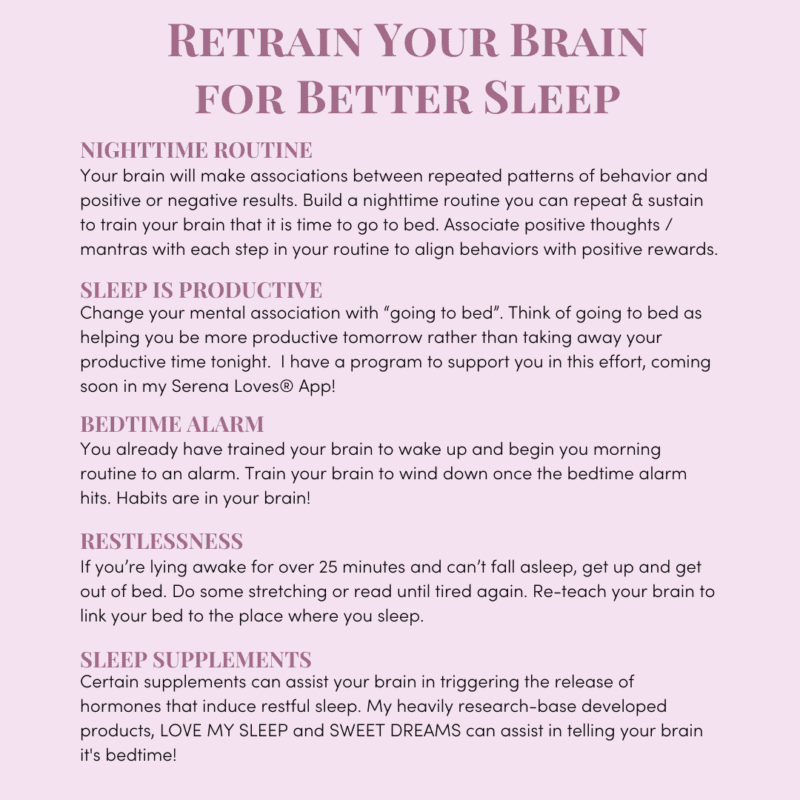
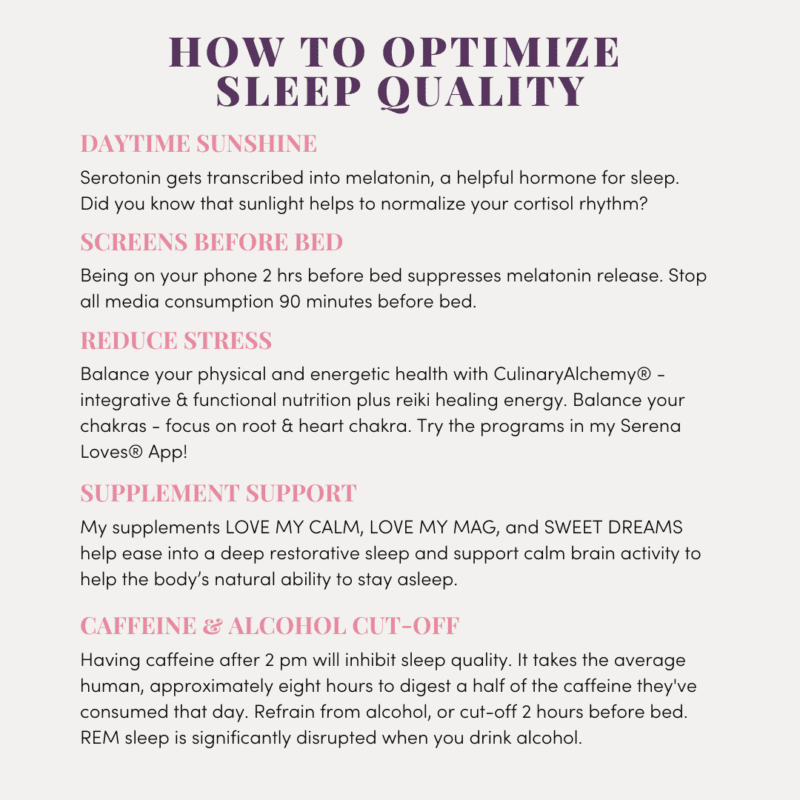
EATING IN SYNC WITH YOUR CIRCADIAN RHYTHM
Being attuned to your natural circadian rhythm can benefit more than your sleep quality, immune system, and hormones, it can also be an important factor in when you eat! Your body processes and responds to foods differently from morning to evening. Eating at unusual times can disrupt your circadian rhythm. Insulin sensitivity is higher in the morning. The insulin that is released when you eat sends timing signals to the biological clocks in your cells, disrupting your body’s ability to distinguish between day and night. In reverse, eating at certain times can help you adjust to a different sleep/wake cycle.
A recent study published in the Endocrine Society’s journal reported that for those with diabetes, eating and avoiding certain foods at night will increase lifespan. Eating grains and healthy carbs in the morning and choosing greens and milk over processed foods at night decreased the risk of heart disease. Start with creating a day and time for your own eating windows and try eating more plant-based meals!
BYOEW- Build your own eating window:
- Pick 2-3 non consecutive weekdays to fast
- Start with a fasting window of 12 hrs and eating window for 12 hrs (progress to 16 hr fasting window)
- Are you a night owl? Opt to start your fasting period later in the evening. Do you love breakfast? Eat your last meal of the day earlier in the evening.
- Stay hydrated during both windows. Try sipping broth or unsweetened green tea if you’re feeling hungry.
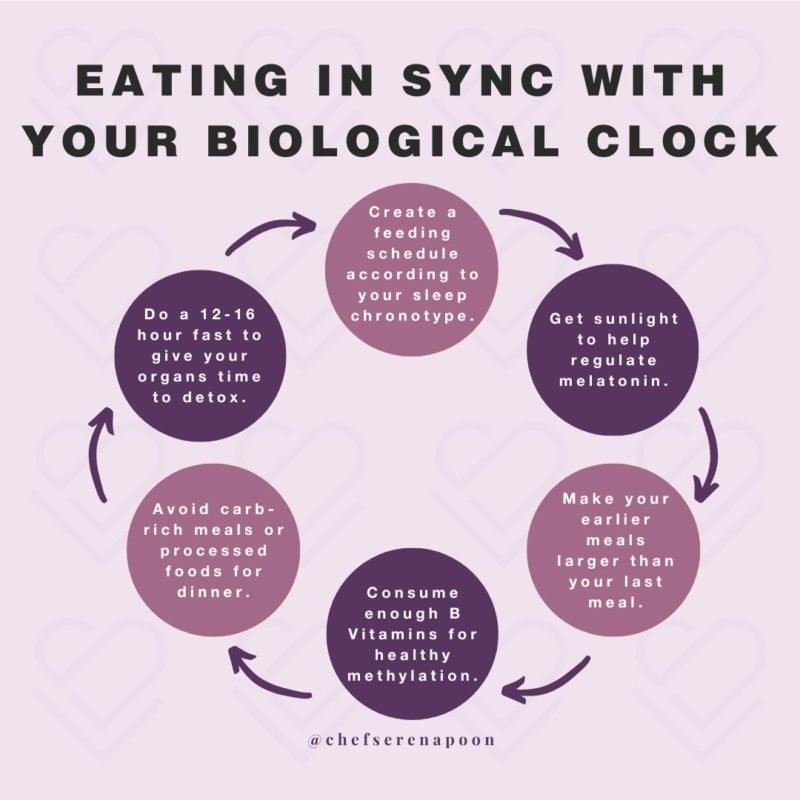
CIRCADIAN RHYTHM AND YOUR ENERGY CENTERS
You understand now how your cells work in accordance with the natural circadian rhythms of our solar system. Did you know that your cells are also vibrating and that those movements are impacted by your environment as well? We refer to the vibrating centers along your body as chakras.
The root chakra is associated with the earth element and is located at the base of the spine. It is considered the foundation of the chakra system and is believed to be responsible for providing a sense of stability, grounding, and connection to the physical body. Connecting to the root chakra can help to promote a sense of physical grounding and stability, which can in turn support healthy sleep habits and help to regulate the circadian rhythm. This is because the root chakra is believed to be closely connected to the body’s physical rhythms and can help to promote a sense of groundedness in your environment. This is especially helpful if you are traveling a lot!
You can also try exercises aimed at opening the crown chakra. This energy center is associated with the element of cosmic energy and is located at the top of the head. It is considered the highest chakra in the system and is believed to be responsible for providing a connection to higher consciousness, wisdom, and spirituality. Connecting to the crown chakra can help to promote a sense of spiritual awareness and connection, which can in turn support healthy sleep habits and help to regulate the circadian rhythm. This is because the crown chakra is closely connected to your internal rhythms as well as bigger picture connectedness to mother nature.
In conclusion …
Understanding your circadian rhythm, or your body’s internal clock, can provide several benefits as discussed above. This week, I encourage you to be observant and also to buy our Sweet Dreams supplements. Get to know your body’s natural sleep-wake cycle, eat in sync with your circadian rhythm, and schedule activities during times when you’re naturally more alert and focused. If you’re struggling with sleep issues or suspect you have a circadian rhythm disorder, consult with a healthcare professional who can help diagnose and treat the problem.
by





